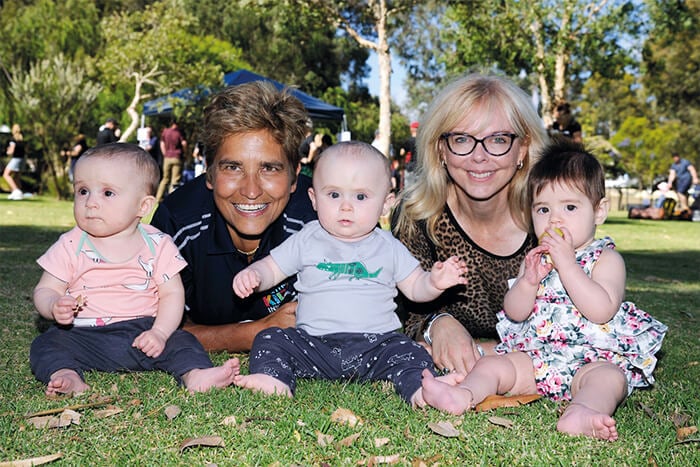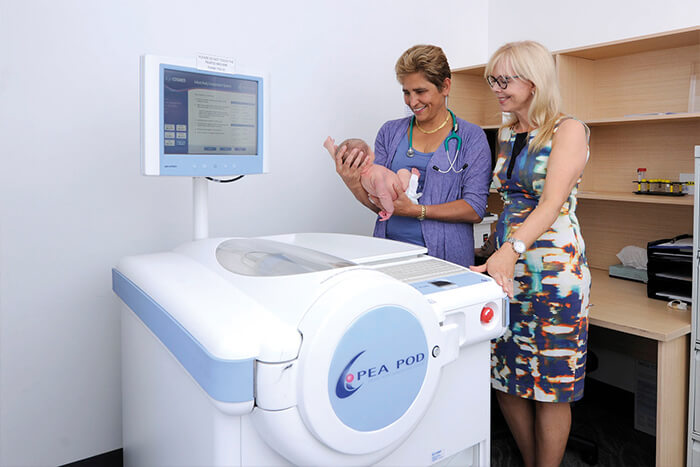
Professor Desiree Silva and Professor Susan Prescott
A collaboration between The Kids Research Institute Australia and Joondalup Health Campus is poised to be a game-changer for early childhood development.
The ORIGINS Project – a longitudinal birth study which will track the progress of 10,000 children born at the northern suburbs hospital over their first five years – will provide a wealth of information that can be used by researchers around the world.
With increasing evidence that a child’s wellbeing may be programmed at a very early stage, the community- based research project aims to find better ways to intervene to promote a healthy start to life and reduce the risk of chronic disease in childhood and later years.
Project Co-Director and paediatric immunologist Professor Susan Prescott said ORIGINS will enable participants to help make a real difference for the next generation.
All up, researchers are seeking to recruit 10,000 families. Active participants will be offered health check-ups during pregnancy and when the child is aged one, two-and- a-half and five years old.
With parental lifestyle and diet plus environmental factors playing a role in a child’s future health, the study will also delve into several aspects of family life from the time the baby is in utero, including family dynamics, physical activity, dietary habits, work, sleep patterns and electronics use, and involve the collection of blood, saliva and hair samples.
The information will be used to assess how a young child’s environment, genetics and their parents’ overall health influence their risk of developing a range of conditions such as allergies, asthma, autism, diabetes, obesity, cardiovascular disease and mental ill-health.
Professor Prescott said it was one of the most comprehensive studies of pregnant women and their families in Australia.
“We see this as a local project with a global vision,” she said. “Although we are focussed on trying to achieve meaningful changes in the lives of the families in the Joondalup-Wanneroo area, we hope, and are very confident, that the results will translate much more generally and be of global interest.
“By understanding that a substantial proportion of risk is programmed very early in life, finding ways to improve resilience and health from the first moments of life is really the best way to address the disease burden.”
Professor Prescott said ORIGINS is intervention- based, with the findings translated and integrated into clinical practice and community education.

Parents are given follow-up support when a risk factor was identified, to help prevent or better manage potential health problems.
“It’s a wonderful opportunity where we can integrate our research program into the daily activities of clinical care,” Professor Prescott said. “ORIGINS can become part of every family’s journey.
“With paediatrician follow-up at one, two-and-a-half and five years, we’ll be keeping a close watch on their health, their development, their allergies, and this will create an opportunity for early referrals if any problems are identified.
“We don’t just want to observe, we want to make a difference, so we are aiming to have a number of nested intervention studies within ORIGINS.”
Some of the associated research programs include:
- SYMBA study: boosts a woman’s gut health with prebiotics during pregnancy and breastfeeding in a bid to reduce allergies in her child
- CARE-Dads study: evaluates the risk of diabetes and cardiovascular disease in expectant fathers
- Pregnancy Lifestyle Activity and Nutrition (PLAN) program: examines whether lifestyle intervention via diet, exercise and wellbeing advice in early pregnancy can reduce offspring obesity
- Testosterone and Language in Kids (TALK) study: aims to understand how testosterone exposure in the womb relates to brain growth and language development in early childhood
The ORIGINS Project is open to pregnant women and their partners planning to deliver their baby at Joondalup Health Campus. Click here to learn more.
What's Next
- New ORIGINS sub-studies are in development including one around personalised medicine using genomic information; another into the use of screen time on electronic devises by families; and a Nature Play study into the behaviour of pre-school aged children which will see how more exposure to nature can help combat anxiety.
The decade-long study began last year, receiving $26 million in funding from the Federal Government and the Paul Ramsay Foundation.
